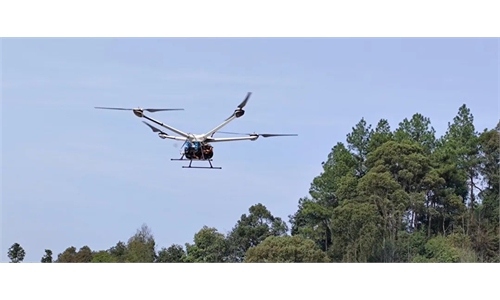
A worker checks computer chips at a factory in Germany. Photo:VCG
The US has become hysterical and unscrupulous in its campaign to contain China's technological rise, even as some of its radical export bans are facing increasing resistance from industry players due to massive losses, Chinese officials and experts said on Tuesday.
The comments came after Washington added more than 30 Chinese companies to its notorious "Entity List" in the latest crackdown move, while media reports suggested that US officials plan to roll back on its strict chip exports bans to allow semiconductor firms in South Korea and the island of Taiwan to maintain and expand their operations in the Chinese mainland.
The contradictory moves underscore both the US' desperation in stepping up efforts to hold back China's technological ascent despite Washington's yearslong crackdown - as well as the mounting difficulties it faces in implementing the endless crackdown measures it has announced, Chinese experts noted. This is also reflected in the broader US approach to China, where Washington continues to intensify the containment campaign, while at the same time seeks dialogues to minimize risks of conflict, they added.
In what has become the embodiment of the US' tech crackdown against China, the US government on Monday added 43 entities to its export control list, known as the "Entity List," accusing these entities of providing training to Chinese military pilots and other activities that threaten US national security. Among the entities, 31 are from China, while the rest are based in countries and regions such as the United Arab Emirates, South Africa and the United Kingdom.
The Chinese Foreign Ministry on Tuesday lambasted the decision. Wang Wenbin, a spokesperson for the ministry, said China resolutely opposes the US' move and demands that the US immediately correct it.
Wang further said the US, in order to maintain its own military and technological hegemony, has "reached a hysterical and unscrupulous point" in baselessly cracking down on Chinese companies. "China will continue to take necessary measures to resolutely safeguard the legitimate rights and interests of Chinese enterprises."
They have added more than 1,200 Chinese entities and individuals to various lists that subject them to various restrictions, which is "economic coercion" and unacceptable, another spokesperson for the ministry said on May 24, while pushing back against the US' claim of "China's economic coercion."
The latest crackdown measure, on top of all the previous measures, shows Washington's desperation more than anything, as such illogical moves fail to deliver what the US seeks, experts said.
Such moves "are based on Cold War mentality and have no support from market logic and economic rules," He Weiwen, a senior fellow at the Center for China and Globalization, told the Global Times.
Mounting resistance
Because of that, the US' moves are increasingly facing rising resistance from industry players both in the US and other countries and regions, which has in some cases forced Washington to roll back some of its strict bans against China.
In the latest sign, the Wall Street Journal reported on Monday that the US government plans to allow top chipmakers from South Korea and the island of Taiwan to maintain and expand their current operations in the Chinese mainland market without US reprisals.
The US government imposed strict curbs on exports of chips and chipmaking equipment to the Chinese mainland in October 2022, when it also granted a one-year exemption to several chipmakers from South Korea and Taiwan island. Those exemptions were due to expire in October, but Alan Estevez, undersecretary of commerce for industry and security, told an industry gathering last week that the government plans to extend those exemptions, according to the report.
"The extended exemption is within expectation because the US fears backlash from the corporate level," Ma Jihua, a veteran industry expert, told the Global Times on Tuesday, noting that the US had hoped that some chipmakers would exit the Chinese market over the past year and expand investment in the US. "But that did not happen, even after the China-South Korea relations hit a new low."
South Korean chipmakers such as Samsung Electronics have a huge presence in the Chinese mainland, including chip manufacturing operations. South Korea also sent 55 percent of its semiconductor exports to China in 2022, compared to only 7 percent to the US, according to South Korean media.
The South Korean government has become increasingly hostile toward China on a political level, in lockstep with the US, but in terms of economic interests, it has shown no willingness to abandon the Chinese market, according to Ma. In fact, "the US so-called Chip 4 alliance is not going well, South Korea and Japan haven't implemented much," he said.
Pointing to the US' plan to extend exemptions, Chinese experts noted that the US' chip crackdown campaign might be showing some cracks, while also warning of further intensified US crackdowns on Chinese technologic sectors.
But for now, amid mounting economic losses and growing global concerns over the rapidly deteriorating China-US relationship, the US has shown certain willingness to ease tensions, Tian Yun, a Beijing-based economist, told the Global Times on Monday. "The continuously tense China-US ties have caused concerns not just in China and the US, but also other countries, including some US allies. Everyone is worried," he said.
Even as they stepped up crackdowns and smearing against China, US officials have recently publicly called for talks with Chinese officials. Many US media outlets have reported that US Secretary of State Antony Blinken might visit China soon.
Asked about the visit on Tuesday, Wang, the spokesperson for the Chinese Foreign Ministry, said he had no additional information. When commenting on Blinken's claims of China's spying efforts in Cuba, Wang urged the US to stop spreading rumors.


